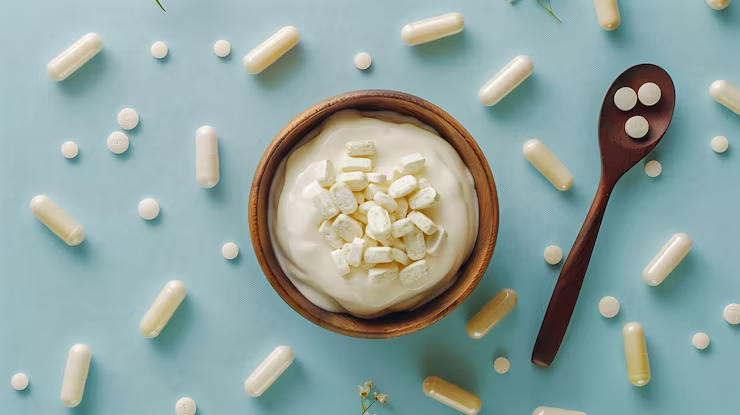Your gut is often called the “second brain” because it plays a vital role in digestion, immunity, metabolism, and even mental health. The gut microbiome, which consists of trillions of bacteria, fungi, and other microorganisms, is essential for breaking down food, absorbing nutrients, and protecting against harmful pathogens. When this balance is disturbed, it can lead to common issues like bloating, constipation, inflammation, and fatigue.
That’s why understanding how to increase gut health is so important for long-term wellness. A healthy gut not only improves digestion but also boosts energy, strengthens immunity, and supports mood stability. By nurturing your gut microbiome, you set the foundation for better overall health and disease prevention.
The good news is that learning how to increase gut health doesn’t require drastic changes. Small steps—like adding probiotic foods, managing stress, exercising, and getting quality sleep—can naturally restore balance and improve digestive function.
This guide explores what gut health is, why it matters, and the top 8 tips on how to increase gut health naturally.

What Is Gut Health ?
Gut health refers to the balance and function of microorganisms living in the digestive tract. These include bacteria, fungi, and other microbes that play a vital role in breaking down food, absorbing nutrients, and supporting immunity. A balanced gut microbiome protects the body from harmful pathogens and keeps digestion smooth.
Poor gut health often shows through bloating, constipation, fatigue, or frequent illness. Research links the gut directly to the brain and metabolism, meaning an unhealthy gut can impact mood, weight, and energy levels. That’s why experts emphasize making gut wellness a priority.
Understanding what gut health is becomes the first step toward healing it. Simple habits like eating probiotics, exercising, managing stress, and staying hydrated make a big difference. If you want long-term wellness, learning how to increase gut health should be part of your lifestyle.
Gut health refers to the balance and function of microorganisms living in your digestive tract. A healthy gut means:
Efficient nutrient absorption.
Strong immune defense.
Smooth bowel movements.
Reduced inflammation.
On the other hand, poor gut health can lead to IBS (Irritable Bowel Syndrome), leaky gut, food intolerances, obesity, autoimmune issues, and even anxiety or depression.
Why Gut Health Matters
Gut health is central to overall well-being because the digestive system affects far more than just food breakdown. A balanced gut microbiome helps absorb essential nutrients, regulate metabolism, and strengthen immunity. Without a healthy gut, your body struggles to get the fuel it needs for energy and growth.
Studies show that poor gut health can contribute to inflammation, obesity, diabetes, and even mental health issues like anxiety or depression. The gut-brain connection means that your digestive system communicates directly with your mind, influencing mood and stress levels. This makes it crucial to focus on habits that maintain microbial balance.
When you learn how to increase gut health through diet, hydration, exercise, and sleep, you unlock better digestion, stronger immunity, and improved mental clarity. Prioritizing gut wellness is not just about avoiding stomach problems—it’s about building a healthier, more resilient body and mind.
Do you also want me to create a section on “When to Start Improving Gut Health” in the same format?
Digestion & Nutrient Absorption: A strong gut breaks down food properly and extracts essential nutrients.
Immune Support: Over 70% of the immune system resides in the gut.
Mental Health: The gut-brain axis links digestion with mood regulation.
Inflammation Control: A balanced gut reduces chronic inflammation, lowering disease risk.
When you focus on how to increase gut health, you are not just supporting digestion—you are boosting your entire body’s performance.
Top Tips on How to Increase Gut Health
Eat Fermented Foods

Fermented foods are one of the most effective dietary additions for those learning how to increase gut health naturally. Yogurt, kefir, sauerkraut, kimchi, and miso contain live probiotics that help restore the balance of good bacteria in the digestive system. By replenishing healthy microbes, these foods support smoother digestion and stronger immunity.
To get started, add 1–2 servings of fermented foods daily. Begin with yogurt containing live cultures or kefir, and then gradually introduce miso soup or a spoonful of kimchi to meals. This makes it easy to build a habit without overwhelming your digestive system.
The benefits are noticeable within weeks. Consuming fermented foods regularly reduces bloating, enhances nutrient absorption, and boosts energy levels. By adding them consistently, you can make fermented foods a cornerstone in your journey toward discovering how to increase gut health naturally and effectively.
Why it works: Fermented foods like yogurt, kefir, kimchi, sauerkraut, and miso are rich in probiotics. These beneficial bacteria restore gut microbiome balance and support healthy digestion.
How to do it: Add 1–2 servings of fermented foods daily. Start small with yogurt or kefir, then gradually include kimchi, miso soup, or sauerkraut.
Benefits: Regular intake of fermented foods reduces bloating, enhances nutrient absorption, and strengthens immunity. Including them is one of the simplest ways on how to increase gut health naturally.
Include Prebiotic Foods
Prebiotics are essential when learning how to increase gut health because they serve as “food” for beneficial bacteria. Unlike probiotics, which introduce live cultures, prebiotics strengthen and multiply the good bacteria already living in your gut. Foods rich in prebiotics include garlic, onions, asparagus, bananas, and oats.
You can easily add these to your diet by mixing bananas with oatmeal at breakfast, including onions and garlic in stir-fries, or snacking on raw asparagus. These simple inclusions ensure you are feeding your microbiome daily. Even small portions can make a noticeable difference in digestion.
The advantages go beyond digestion. Prebiotics enhance nutrient absorption, reduce inflammation, and support a healthier metabolism. By consistently including them, you create a strong foundation for gut restoration. Together with probiotics, they form a powerful duo for anyone who wants to know how to increase gut health in a natural and sustainable way.
Why it works: Prebiotics are dietary fibers that feed good bacteria, promoting their growth and diversity. Foods like garlic, onions, asparagus, oats, and bananas are excellent sources.
How to do it: Add garlic and onions to soups or stir-fries, enjoy oatmeal with bananas, or snack on raw asparagus. Aim to include prebiotics in at least one meal daily.
Benefits: Prebiotics boost digestion, improve mineral absorption, and reduce inflammation. Together with probiotics, they create a strong foundation for gut health improvement.
Stay Hydrated
Hydration plays a surprisingly vital role in how to increase gut health, as water supports nearly every digestive process. It helps move food smoothly through the intestines, aids nutrient absorption, and prevents constipation. A hydrated gut also maintains a healthy mucosal lining that protects against harmful bacteria.
To improve hydration, aim for 2–3 liters of water daily, adjusting for your activity level and environment. Herbal teas such as chamomile, peppermint, or ginger are excellent additions because they calm digestion while boosting hydration. Avoid excessive caffeine or alcohol, as both can dehydrate your gut.
Consistently drinking enough water prevents bloating, improves bowel regularity, and enhances overall digestive comfort. It also makes other gut health strategies more effective, from probiotics to fiber intake. For anyone exploring how to increase gut health, hydration is a simple yet powerful daily habit that cannot be overlooked.
Why it works: Water supports digestion, nutrient transport, and waste elimination. It also helps maintain the mucosal lining of the intestines.
How to do it: Drink 2–3 liters of water daily depending on your activity level. Herbal teas like peppermint, chamomile, or ginger can also soothe digestion.
Benefits: Proper hydration prevents constipation, reduces bloating, and ensures smooth digestion. It’s a key strategy for anyone seeking how to increase gut health.
Limit Processed and Sugary Foods
One of the biggest enemies of gut health is processed food and sugar. If you’re serious about how to increase gut health, reducing these should be a priority. Processed foods and refined sugars feed harmful bacteria, leading to bloating, inflammation, and imbalances in the gut microbiome.
The solution is to swap sugary snacks and processed meals for whole foods. Replace soda with infused water, candy with fruits, and chips with nuts or seeds. Reading labels helps you avoid hidden sugars and artificial additives that quietly harm your gut bacteria.
Over time, these changes restore microbial balance, lower inflammation, and improve metabolism. Your body feels lighter, and your digestion becomes smoother. By cutting down on processed foods and sugar, you’ll notice a real transformation in gut function—making this one of the most impactful steps in learning how to increase gut health effectively.
Why it works: Processed foods, refined sugars, and artificial sweeteners feed harmful bacteria, causing imbalances in the gut.
How to do it: Replace sodas and candy with fruits, nuts, and whole grains. Focus on fresh, whole foods instead of packaged snacks.
Benefits: Reducing processed food improves microbial balance, lowers inflammation, and stabilizes metabolism. Cutting sugar is a crucial step in learning how to increase gut health naturally.
Take Probiotic Supplements

Probiotic supplements can be a practical solution for anyone wondering how to increase gut health, especially after antibiotics or digestive imbalances. These supplements contain live bacterial strains that replenish and diversify your microbiome, improving digestion and immunity.
When choosing a probiotic, opt for a high-quality brand with multiple strains and at least 10–20 billion CFUs. Take them on an empty stomach or as directed by a healthcare professional. This ensures that the beneficial bacteria survive stomach acid and reach your gut effectively.
The benefits include relief from IBS symptoms, reduced bloating, and faster recovery after illness. Probiotic supplements don’t replace a healthy diet but complement it, making them especially useful when fermented foods aren’t always available. For people looking at quick and reliable methods on how to increase gut health, supplements can be a safe and effective option.
Why it works: Probiotic supplements introduce targeted bacterial strains to support a healthy microbiome, especially after antibiotics or digestive issues.
How to do it: Choose a high-quality probiotic with multiple strains and at least 10–20 billion CFUs. Take them on an empty stomach for best absorption.
Benefits: Supplements relieve IBS symptoms, restore balance after antibiotics, and reduce bloating. They are a practical solution for those exploring how to increase gut health quickly.
Manage Stress Levels
The gut and brain are deeply connected through the gut-brain axis, making stress management critical for anyone learning how to increase gut health. Chronic stress disrupts microbial balance, slows digestion, and increases inflammation.
Practical stress management techniques include yoga, deep breathing, journaling, or mindfulness meditation. Even dedicating 10 minutes daily to relaxation can help regulate cortisol levels and ease digestive strain. Regular stress relief routines make a significant difference over time.
The benefits go beyond just gut comfort. Managing stress improves nutrient absorption, enhances energy, and balances mood. Since stress is often overlooked in digestive health, addressing it holistically is one of the smartest steps you can take when understanding how to increase gut health naturally.
Why it works: Stress disrupts the gut-brain connection, altering microbial composition and slowing digestion. Chronic stress increases inflammation and weakens immunity.
How to do it: Practice meditation, deep breathing, journaling, or yoga. Even 10 minutes daily of mindfulness can calm the nervous system.
Benefits: Stress management enhances digestion, reduces bloating, and improves mood. A balanced lifestyle is essential in any plan on how to increase gut health holistically.
Get Regular Exercise

Exercise is another overlooked but powerful factor in how to increase gut health. Physical activity boosts microbial diversity, stimulates bowel motility, and helps reduce bloating while also managing stress.
To get results, aim for 30–40 minutes of moderate exercise most days of the week. Activities like brisk walking, cycling, swimming, or even strength training are excellent choices. Regular movement ensures that your digestive system stays active and balanced.
The benefits are long-term. Exercise promotes healthy digestion, reduces constipation, and enhances the growth of beneficial bacteria in the gut. Pairing consistent physical activity with good nutrition creates a sustainable plan for anyone wanting to learn how to increase gut health naturally.
Why it works: Physical activity improves bowel motility, boosts microbial diversity, and reduces stress.
How to do it: Aim for 30–40 minutes of moderate exercise such as brisk walking, swimming, cycling, or strength training at least 4–5 times a week.
Benefits: Exercise promotes regular bowel movements, reduces bloating, and enhances beneficial bacteria growth. Combining fitness and nutrition is an effective way on how to increase gut health naturally.
Prioritize Quality Sleep
Quality sleep is one of the most overlooked aspects of how to increase gut health. Poor sleep disrupts circadian rhythms and negatively affects the composition of gut bacteria, leading to inflammation and digestive discomfort.
To improve sleep, aim for 7–9 hours nightly. Stick to a consistent bedtime, avoid screens before sleep, and create a calming environment. Herbal teas like chamomile can also support deeper rest and relaxation.
Getting enough quality sleep enhances mood, restores energy, and allows the gut microbiome to repair itself overnight. This simple yet powerful habit ensures long-term balance and stability in your digestive system. For anyone serious about how to increase gut health, proper rest is as important as diet and exercise.
Why it works: Poor sleep disrupts circadian rhythms and harms gut microbiota, leading to inflammation and digestive issues.
How to do it: Maintain a consistent bedtime, avoid caffeine late in the day, and keep your bedroom dark and cool.
Benefits: Adequate sleep reduces stress, restores energy, and supports microbiome diversity. Proper rest is one of the most overlooked strategies for how to increase gut health effectively.
Additional Lifestyle Tips for Better Gut Health
Eat more fiber from whole grains, legumes, and vegetables.
Avoid unnecessary antibiotics that disrupt gut flora.
Chew food slowly to improve digestion.
Limit alcohol, which can irritate the gut lining.
Common Signs of Poor Gut Health
Frequent bloating or gas
Constipation or diarrhea
Food intolerances
Constant fatigue
Unexplained mood swings
If you notice these, it’s time to focus on how to increase gut health naturally.
Conclusion

Your gut is central to overall health, from digestion to immunity and mental well-being. By eating more probiotics and prebiotics, drinking enough water, exercising, managing stress, and getting proper sleep, you can naturally restore balance to your microbiome.
The journey of how to increase gut health is not about quick fixes but about long-term lifestyle habits. Start small, stay consistent, and you’ll notice improved energy, digestion, mood, and overall wellness.
FAQs
Q1: How long does it take to improve gut health ?
It can take a few weeks to several months depending on your diet, lifestyle, and overall health. Consistency is key.
Q2: Can gut health affect skin ?
Yes, poor gut health is linked to acne, eczema, and other skin conditions due to inflammation and toxin buildup.
Q3: Do I need probiotics daily ?
Not always. If you eat fermented foods regularly, supplements may not be necessary. But during antibiotic use, probiotics can help restore balance.
Q4: Can stress affect gut health ?
Yes, stress disrupts digestion and microbiome balance, so stress management is key.
Q5. Is water important for gut health ?
Absolutely, hydration supports digestion, prevents constipation, and boosts microbiome function.


